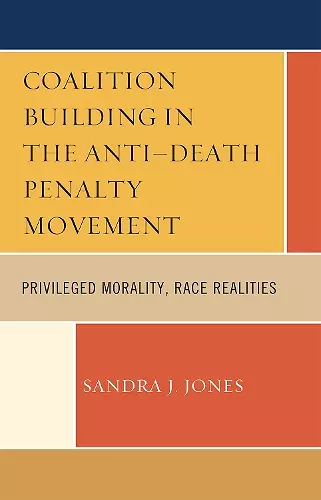Coalition Building in the Anti-Death Penalty Movement
Privileged Morality, Race Realities
Format:Hardback
Publisher:Lexington Books
Published:5th Jan '10
Currently unavailable, and unfortunately no date known when it will be back

While a great deal of research has been done about many aspects of the death penalty, very little attention has been paid to the movement organized against it. Coalition Building in the Anti-Death Penalty Movement fills that gap with an empirical examination of the external and internal factors that shape the role race plays in the anti-death penalty movement. While the death rows across the U.S. are overwhelmingly filled with racial minorities and the poor, the ranks of the anti-death penalty movement are dominated by white, middle-class professionals. The attention given to race arises out of this racial distinction between death row inmates and the activists who advocate for them. By conducting interviews with white, black, and Latino anti-death penalty activists, this book examines the influence of race on the mobilization of activists and their approach toward abolition. The concepts of political opportunity, mobilizing structures, and framing provided by the political process model, are used to describe the complex manner in which moral opposition to the death penalty is shaped by the racial realities of the activists. Although racial tensions lie just below the surface, they nonetheless create real obstacles for the movement as it strives to build a racially diverse coalition of activists aimed at death penalty abolition.
The death penalty is a scandal in itself, as the dedicated members of the movement to abolish it know so well. The racism of the death penalty is a scandal WITHIN that scandal, as Sandra Jones demonstrates with fierce dedication and honesty in this book. The product of years of intensive research, a thorough grasp of the social science literature, a deeply felt activism and sense of social justice, and an inspiring sense of humanity, Jones's study both moves us deeply and enlightens us profoundly. This book will serve as the action manual for the anti-death penalty movement as it advances toward its long-delayed goal of abolition. Highly recommended for those who seek justice and mercy, for those who oppose racism, and for those who want to teach or learn about social movements in the contemporary United States. -- Howard Winant, director, Center for New Racial Studies, University of California Santa Barbara; author, The World Is A Ghetto: Race and Democracy Since World War II
This book is no exercise in sterile, disinterested research. Jones’ investigation of one of the persistent difficulties faced by the movement to abolish America’s death penalty—the failure to mobilize the African American and Latino communities effectively—is driven by her passionate opposition to both capital punishment and racial injustice. As is always true of the best politically engaged scholarship, her conclusions have immediate value to those struggling in the trenches. Indeed, their value grows as capital punishment’s grip on public opinion wanes. -- Herbert Haines, SUNY-Cortland
Jones has courageously taken one of the most—perhaps the most—painful internal problems of the movement and has calmly and meticulously examined it from the perspective of black and white participants. Bringing this issue out of private discussion and into the light of scholarly examination should make it possible for participants in the movement to evaluate and cope with this painful and destructive divide. -- Margaret Vandiver, University of Memphis
ISBN: 9780739120385
Dimensions: 244mm x 162mm x 25mm
Weight: 617g
314 pages